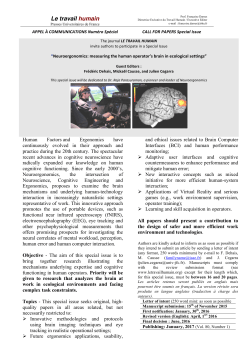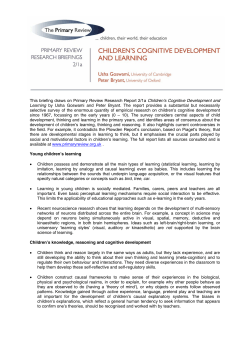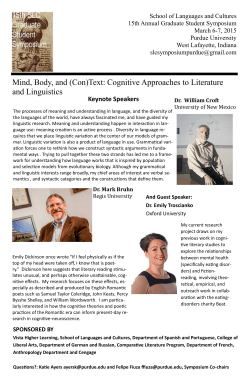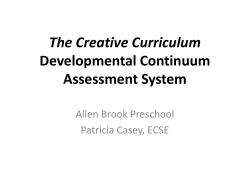
Cognitive Learning 6.1 Using Thinking to Learn The
Page 1 of 6 Cognitive Learning 6.1 Using Thinking to Learn The Cognitive Learning Theory explains why the brain is the most incredible network of information processing and interpretation in the body as we learn things. This theory can be divided into two specific theories: the Social Cognitive Theory (SCT), and the Cognitive Behavioral Theory (CBT). When we say the word “learning”, we usually mean “to think using the brain”. This basic concept of learning is the main viewpoint in the Cognitive Learning Theory (CLT). The theory has been used to explain mental processes as they are influenced by both intrinsic and extrinsic factors, which eventually bring about learning in an individual. Cognitive Learning Theory implies that the different processes concerning learning can be explained by analyzing the mental processes first. It posits that with effective cognitive processes, learning is easier and new information can be stored in the memory for a long time. On the other hand, ineffective cognitive processes result to learning difficulties that can be seen anytime during the lifetime of an individual. A. Social Cognitive Theory In the Social Cognitive Theory, we are considering 3 variables: behavioral factors environmental factors (extrinsic) personal factors (intrinsic) These 3 variables in Social Cognitive Theory are said to be interrelated with each other, causing learning to occur. An individual’s personal experience can converge with the behavioral determinants and the environmental factors. Social Cognitive Theory Illustration In the person-environment interaction, human beliefs, ideas and cognitive competencies are modified by external factors such as a supportive parent, stressful environment or a hot climate. In the person-behavior interaction, the cognitive processes of a person affect his behavior; likewise, performance of such behavior Page 2 of 6 can modify the way he thinks. Lastly, the environment-behavior interaction, external factors can alter the way you display the behavior. Also, your behavior can affect and modify your environment. This model clearly implies that for effective and positive learning to occur an individual should have positive personal characteristics, exhibit appropriate behavior and stay in a supportive environment. In addition, Social Cognitive Theory states that new experiences are to be evaluated by the learner by means of analyzing his past experiences with the same determinants. Learning, therefore, is a result of a thorough evaluation of the present experience versus the past. Basic Concepts Social Cognitive Theory includes several basic concepts that can manifest not only in adults but also in infants, children and adolescents. 1. Observational Learning learning from other people by means of observing them is an effective way of gaining knowledge and altering behavior. 2. Reproduction the process wherein there is an aim to effectively increase the repeating of a behavior by means of putting the individual in a comfortable environment with readily accessible materials to motivate him to retain the new knowledge and behavior learned and practice them. 3. Self-efficacy the course wherein the learner improves his newly learned knowledge or behavior by putting it into practice. 4. Emotional coping good coping mechanisms against stressful environment and negative personal characteristics can lead to effective learning, especially in adults. 5. Self-regulatory capability ability to control behavior even within an unfavorable environment. B. Cognitive Behavioral Theory Page 3 of 6 Cognitive Behavioral Theory describes the role of cognition (knowing) to determining and predicting the behavioral pattern of an individual. This theory was developed by Aaron Beck. The Cognitive Behavioral Theory says that individuals tend to form self-concepts that affect the behavior they display. These concepts can be positive or negative and can be affected by a person’s environment. The Cognitive Triad Cognitive Behavioral Theory further explains human behavior and learning using the cognitive triad. This triad includes negative thoughts about: 1. The self (i.e., I am rubbish) 2. The world/environment (i.e., the world is irrational) 3. The future (i.e., my future is doomed) 6.2 Cognitive learning styles Cognitive Learning Styles — Cognitive Skills and Effective Learning Cognitive skills are the essential but often overlooked fundamental tools of effective learning. Learning is not about how much you know, but how effectively you process or handle the information you receive. Cognitive skills are the mental mechanisms that process incoming information. Mental Skills, Not Academic Subjects Cognitive skills are not the subjects taught in classrooms at schools. Those are academic skills or disciplines. Academics consist of an accumulation of knowledge, rules, and systems concerning different subjects like algebra, history, spelling, and foreign language. People are often unaware that there is a difference between cognitive and academic skills. Actually, the difference is very significant. Cognitive skills are the individual mental capabilities needed to successfully learn and use academic disciplines such as geometry, social studies, and science. Cognitive skills are the underlying tools that enable you to successfully think, prioritize, plan, understand, visualize, remember, create useful associations, and solve problems. The importance of cognitive skills are summed up in the following points: When cognitive skills are strong, academic learning is fast, easy, efficient, and even fun. When cognitive skills are weak, academic learning will be a struggle or even impossible. Therefore, cognitive skills are the essential tools for effective learning. Page 4 of 6 Cognitive Learning Styles — Identifying Weak Cognitive Skills Cognitive skills are not easy to see or recognize through casual observation. They function behind the scenes as you process the information received from every possible source — sound, touch, sight, and even information received from yourself when you are thinking, speculating, or recalling. Because of this “behind the scenes” nature of cognitive skills, an appropriate assessment test is essential for the identification and treatment of weak cognitive skills. A person’s cognitive skill set is made up of several cognitive skills including auditory processing, visual processing, short and long term memory, comprehension, logic and reasoning, and attention skills. Each of these can also be divided into identifiable sub-skills. For example, auditory processing is made up of sub-skills such as sound discrimination, sound analysis, sound segmenting, and sound blending. Memory consists of short-term, long-term recall, and working memory. Each of these skills and sub-skills play a specific and necessary role and must work in concert before an individual can learn effectively. Weak skills result in a diminished capacity to learn. Cognitive Learning Styles — Cognitive Skills Can Change For over 40 years, science has continued to confirm that cognitive skills can be developed and strengthened. At LearningRx, we embrace the idea that intense, focused training can strengthen weak skills. We have developed specific programs and exercises that specialize in identifying and strengthening weak cognitive skills. If you, or someone you know, struggles to learn or read, weak underlying cognitive skills are most likely the reason. If this is the cause of the learning and reading problems, it can be corrected and you can experience a lifetime of faster, easier learning and reading. 6.3 Cognitive Skills What are cognitive skills? Cognitive Skills—A Formal Definition Cognition is the umbrella term for your learning skills—your ability to process information, reason, remember, and relate. 1. 2. 3. 4. You are taught something, some new info You think about it You talk about it in your own words You notice how this new info fits into other things that you know Page 5 of 6 Cognitive Skills Cognitive skills are what separate the good learners from the so-so learners. Here’s why: Without developed cognitive skills, children fall behind because they aren’t able to integrate new information as they are taught it. The sad truth is that most students move on to the next grade before they have mastered the basic academic skills like reading, writing and math… because they haven’t developed cognitive skills. Remember: The ability to learn and make sense of new information is crucial to successful learning… and that’s why developing cognitive skills is so important. That’s what we do The following describes key cognitive skills that are critical for learning. Attention Skills: A student’s ability to attend to incoming information can be observed, broken down into a variety of sub-skills, and improved through properly coordinated training. We train and strengthen the three primary types of attention: Sustained Attention: The ability to remain focused and on task, and the amount of time we can focus. Selective Attention: The ability to remain focused and on task while being subjected to related and unrelated sensory input (distractions). Divided Attention: The ability to remember information while performing a mental operation and attending to two things at once (multi-tasking). Memory: The ability to store and recall information: Long-Term Memory: The ability to recall information that was stored in the past. Long-term memory is critical for spelling, recalling facts on tests, and comprehension. Weak long-term memory skills create symptoms like forgetting names and phone numbers, and doing poorly on unit tests. Short-Term / Working Memory: The ability to apprehend and hold information in immediate awareness while simultaneously performing a Page 6 of 6 mental operation. Students with short-term memory problems may need to look several times at something before copying, have problems following multi-step instructions, or need to have information repeated often. Logic and Reasoning: The ability to reason, form concepts, and solve problems using unfamiliar information or novel procedures. Deductive reasoning extends this problem-solving ability to draw conclusions and come up with solutions by analyzing the relationships between given conditions. Students with underdeveloped logic and reasoning skills will generally struggle with word math problems and other abstract learning challenges. Symptoms of skill weaknesses in this area show up as questions like, “I don’t get this”, “I need help…this is so hard”, or “What should I do first?” Auditory Processing: The ability to analyze, blend, and segment sounds. Auditory processing is a crucial underlying skill for reading and spelling success, and is the number one skill needed for learning to read. Weakness in any of the auditory processing skills will greatly hinder learning to read, reading fluency, and comprehension. Students with auditory processing weakness also typically lose motivation to read. Visual Processing: The ability to perceive, analyze, and think in visual images. This includes visualization, which is the ability to create a picture in your mind of words or concepts. Students who have problems with visual processing may have difficulty following instructions, reading maps, doing word math problems, and comprehending. Processing Speed: The ability to perform simple or complex cognitive tasks quickly. This skill also measures the ability of the brain to work quickly and accurately while ignoring distracting stimuli. Slow processing speed makes every task more difficult. Very often, slow processing is one root of ADHD-type behaviors. Symptoms of weaknesses here include homework taking a long time, always being the last one to get his or her shoes on, or being slow at completing even simple tasks.
© Copyright 2025









